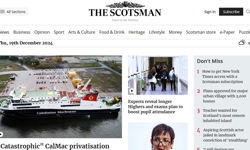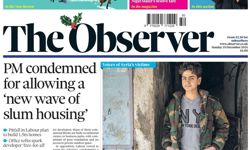I think the point where my heart really sank was watching the BBC’s live coverage of the Parliamentary love-in on Monday night showing MPs’ delight at reaching the cross-party deal on the Royal Charter plan for press regulation.
It wasn’t the deal that was so alarming. A Royal Charter had been on the cards for weeks. Had we crossed the Rubicon? I wasn’t sure. Was it “statutory underpinning”? Some said yes, others no. Ever since Leveson, we’ve been grappling with Orwellian concepts like enforced “voluntary self-regulation”.
What I found worrying was the way the politicians looked so pleased with themselves. One after another, they congratulated each other. “At last,” they seemed to be saying, “We’ve been brave enough to stand up to the press”. This seemed personal.
Louis Heren, The Times correspondent was once told by a US journalist: “Whenever you are interviewing a politician, always keep at the front of your mind the question: ‘Why is this lying bastard lying to me’.”
After Monday night, I think the Press should be asking itself: “Why are those bastards looking so happy?”
Reaction was swift. Surprise, surprise the press didn’t immediately embrace the Royal Charter deal with the same enthusiasm as the Parliamentarians, not least because of a major PR blunder by those who thrashed out the deal in the early hours of the morning.
Can you imagine how apoplectic the Fleet Street targets of Hacked Off – described by the Daily Mail as “a self-appointed cadre of Press-hating zealots, tarnished celebrities and small-town academics" – were when they found out members of the campaign group were in on the talks while press representatives were shut out?
It was a point that The Mail, Telegraph, News International, the Newspaper Society and the PPA made in a press statement on Monday night. "We would like to make it clear that, contrary to reports broadcast by the BBC this morning, no representative of the newspaper and magazine industry had any involvement in, or indeed any knowledge of, the cross-party talks on press regulation that took place on Sunday night.”
It added that the draft Royal Charter: “Contained several deeply contentious issues which have not yet been resolved with the industry”.
Then Adrian Jeakings, president of the Newspaper Society and chief executive of Archant, issued his own statement in which he said: “The deal announced by the three main political parties today completely ignores the Leveson recommendations on the local press. The Royal Charter proposals agreed by the Conservatives, Liberal Democrats and Labour - with huge financial penalties for newspapers which choose to be outside the system and an arbitration service which would open the floodgates to compensation claimants - would place a crippling burden on the UK’s 1100 local newspapers inhibiting freedom of speech and the freedom to publish.”
At last, the real world of journalism intruded into the back-slapping world of the politicians. If anyone needs to know how tough it is out there in the regions, look at the financial results from Johnston Press announced on Tuesday, which shows that the company cut more than a fifth of its workforce during 2012 with around 1,300 jobs axed.
Don’t tell anyone, but the much maligned Press Complaints Commission actually worked well for the regional press and its readers without involving undue cost, time and, above all, lawyers.
But of course the focus is always on the nationals. When most journalists are asked, “What did you do in the Great Press Regulation War, Daddy?” they will answer that they just got on with their jobs and watched while Fleet Street and the politicians thrashed about. Most journalists have had nothing to do with phone hacking and don’t see why they should be the victims of some kind of collective punishment.
As for Fleet Street? Well, it’s like herding cats to get them to agree. The Guardian, FT and Independent had already broken ranks with the hardliners of the Mail, Telegraph and News International even before the politicians finalised the Royal Charter plan.
But then, unlike our party leaders on Monday night, journalists don’t always agree. Journalists can be difficult, argumentative and pig-headed. They work in different sectors, they have different political views and they earn different amounts of money.
Press regulation is always aimed at the national newspapers and their owners because that is what and who our national politicians are obsessed with.
Look at the difficulty the Government has had trying to look beyond the national press and answer whether or not material on the internet, blogs or Twitter would be covered by the Royal Charter.
It was as if “what can we do about this Internet-thingy” was just an afterthought. Political blogger Guido Fawkes was told at first that he wouldn’t be covered by the Royal Charter, and then that he would.
There are other crucial questions left unanswered, not least how much will it cost newspapers and magazines. Then there are fears that third-party complaints will be allowed, leading to a torrent of vexatious complaints.
The Spectator has given the charter plan a definite “no” and Private Eye editor Ian Hislop has indicated he will also reject it. But that would leave them, and any other title, deciding not to join the new regulator facing “exemplary” damages if they lose court cases – a move which some argued is contrary to European human rights law on freedom of expression.
The publishing industry is going to take a long, hard look at the draft Royal Charter and many of its members are not in a mood to embrace it.
On Monday night MPs thought it was all over. It’s not now.












